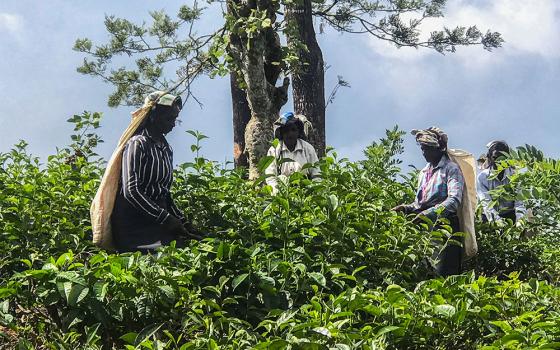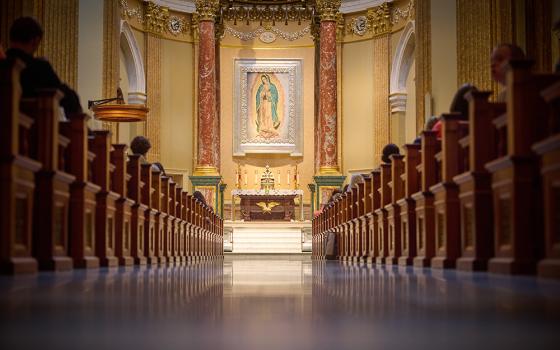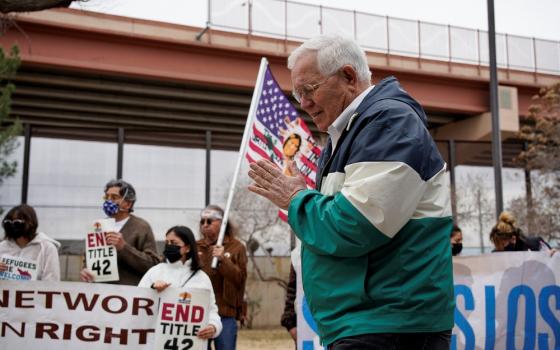
Sr. Miriam Francis Perlewitz (Maryknoll Sisters of St. Dominic, Inc.)
Holy Spirit Major Seminary, Banani, in Dhaka, is the only national seminary in Bangladesh and celebrated its golden jubilee on April 19. Sr. Miriam Francis Perlewitz of the Maryknoll Sisters of St. Dominic served at the seminary for 25 years as a professor of Scripture and Greek language (1985-2010). Perlewitz was born on Oct. 6, 1930.
She has been residing in the country for almost 40 years and is currently serving as the principal of an English medium school. She is the only nun to have served at the seminary for an extended period as a professor, and many of the country's priests, bishops and archbishops are her former students. Her former students admire her for her remarkable contribution to the formation of priests. The seminary was established in August 1973, with nine students. Since then, it has produced 445 priests, including three archbishops, six bishops, 83 religious brothers and 11 sisters. Currently, a total of 117 students are enrolled in the seminary.
The seminary provides a comprehensive education, covering subjects such as Bible studies, philosophy, theology, canon law, other religions and language education, totaling 72 subjects. Some religious brothers and sisters also take short courses at the seminary.
Perlewitz took her first vows on May 8, 1951, in Valley Park, Missouri, and her final vows on May 8, 1954, in New York. In 1977, she received a doctorate of philosophy in biblical language/literature from St. Louis University in St. Louis, Missouri.
GSR: Please tell us why, when and how you arrived in Bangladesh as a missionary.
Perlewitz: I arrived in Bangladesh in 1985 to teach Scripture six months a year. The other six months involved teaching at the Maryknoll School of Theology in New York. The course was taught in English, which I always felt was difficult for some of the students and perhaps would have been more advantageous if the students had a choice to receive instruction in English or Bangla. After all, seminary teaching meant preparing for parish work in the villages where no one spoke English.
This arrangement lasted about four years until the school of theology in New York was closed, and a choice was given to remain permanently in Bangladesh to continue the ministry of the Word.

Sr. Miriam Francis Perlewitz talks with young seminarians in 1989 at Holy Spirit Seminary, Banani in Dhaka, Bangladesh, where she taught for 25 years. (Maryknoll Mission Archives)
You taught at Holy Spirit Major Seminary, Banani, for a long time as a Scripture and Greek language professor. How were those days at the seminary?
First of all, one must love the subject. For a teacher to entice students into the rapture of her course of study, she must be totally dedicated. That means committed not to the profession of teaching but to the content of the material she is bound to deliver.
Another challenge is to manage languages in which the word of God was presented to us by the early fathers of the church. Hebrew, Greek, Latin, German and French are hurdles to be tackled. But a [basic] reading knowledge is satisfactory and is manageable.
Once the foundation is laid, there is simply the desire to spread the good news in the way you have been chosen to do. Study, teach and learn. I have always discovered that the best way to learn is to teach; the task is reciprocal.

Library of Holy Spirit Seminary, Banani, which has about 43,000 books (Sumon Corraya)
Holy Spirit Major Seminary just celebrated its golden jubilee. Would you share with us how this seminary played a role in the tiny Bangladesh church?
When I first began my ministry of teaching Scripture at the seminary, there were professors from all over the world. It was exhilarating to drink in the viewpoints of these scholars. This type of faculty made it possible for the young men to be exposed to a universal church. But the ministry lasted only two short years.
Naturally, these young men moved on and eventually became active. Some became parish priests or teaching brothers, and others became bishops or archbishops. But all were dedicated to the service of their compatriots in the village or a city like Dhaka. It was expected that all these young men would be devoted to the service of their fellow men. Several Salesian sisters were also permitted to attend classes and spread the word of God in their own [inimitable] ways.
As a professor, besides academic lessons, what types of teachings have you provided to your students at the seminary?
Teachers are more than guides for the mind. They also support the ethical and moral teachings of the people of God. Their lives bear witness to the importance of being community and fellow travelers on the road to our permanent home.
Advertisement
As a religious woman, you contributed to producing priests in the seminary. How do you feel about it?
Who wouldn’t be captivated by the challenge to study something as awesome as a text that poses to be the word of God? At times, one is mesmerized by the message which comes to fruition. Thus, the inability to pursue the task of formulating a sentence or even a short statement. In other words, the word of God captivates you.
There have always been classes for pastoral instruction and guidance when launching out to do pastoral ministry. If the student is motivated and intent on being a member of the teaching body of the church, there should be no difficulty for this person to seek help and assistance from his pastor. What the young members of the church are lacking is experience. And experience, whether long or short, is the best teacher since we learn from our mistakes.
Do you have any suggestions for present professors and teachers working for Holy Spirit Major Seminary, Banani?
It would be risky, but a year or two of lived experience may be something to consider before delving into a service role in the church. Anticipation may enhance the future perspective. It would also give the young minister the opportunity to know firsthand what the parishioners live through in their rudderless life.

Holy Spirit Seminary, Banani in Dhaka, Bangladesh (Sumon Corraya)
Please share your present ministry in Bangladesh and how you reach God’s message through his ministry.
Due to the death of my companion at Bacha English Medium School, it was necessary to stop my involvement at the seminary. Then, I took on the role of principal and teacher at Bacha English Medium School. This ministry is the same; whether old or young, we all have the need to make God’s love visible. These youngsters are beginning their long search for meaning, and they can best do this by enjoying a leap of faith with substantive material to bolster their talents for future achievements.
Would you like to tell me anything else?
There are many professions for one to pursue in life. But to choose teaching as a mission (or service) is more than a challenge; it is a never-ending search.
After 25 years of spreading the word of God, I never really knew if the effort was bearing fruit. But that wasn't my responsibility; my major role was to make the word of God alive in the minds and hearts of the hearers and, in this case, students of the seminary. I had spent four years in the Maryknoll major seminary in New York. The real challenge was to find out if the word of God was audible to those in a far-off country like Bangladesh. And that is how the test was to be proven.
One can only do what one is capable of; gifts are given and are to be given in return. That enables one to find great satisfaction in doing and giving.








